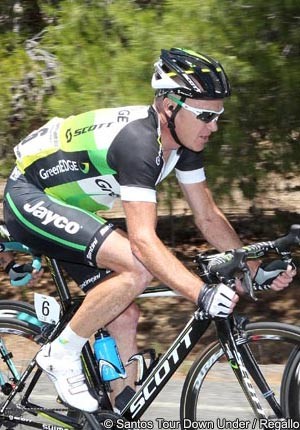Australian rider insists Paris-Roubaix, Olympic and Tour de France wins were clean
 Having denied ever doping and then admitting in July to using EPO prior to the 1998 Tour de France, Stuart O’Grady insists that that was the only occasion when he utilised the banned product, and that most of his big victories were clean.
Having denied ever doping and then admitting in July to using EPO prior to the 1998 Tour de France, Stuart O’Grady insists that that was the only occasion when he utilised the banned product, and that most of his big victories were clean.
The Australian, who unexpectedly retired two days prior to his admission of July 24th, said he was confident that nothing more would ever emerge about his career.
“I can comfortably sit back and I know that no one can come along and say I have a positive test anywhere else. In 100 years’ time my grandkids won’t be hearing any new stories about my racing past,” O’Grady says, quoted in the new book Green, Gold & Bold.
“I won Paris-Roubaix and my Olympic gold medal plus all my other Tour de France successes clean. I am happy for all my tests ever taken after 1998 to be re-tested. Any time.”
O’Grady was implicated in likely doping when the French Senate published its report into banned substances on July 25th. That report listed the results of reanalyses of samples from the 1998 Tour, which was tainted by the Festina Affair.
A large number of riders were named positive in those retests, including race winner Marco Pantani, runner-up Jan Ullrich, yellow jersey wearer Laurent Desbiens, stage winners Jens Hepper, Jerome Blijlevens, Mario Cipollini and Jacky Durand, runners-up Erik Zabel and Nicola Minali and third-place stage finisher Fabio Sacchi.
Also snagged retrospectively for EPO were Andrea Tafi, Marcos Serrano, Udo Bolts, Eddy Mazzoleni, Laurent Jalabert, Kevin Livingston, Bo Hamburger, Abraham Olano and Manuel Beltran.
O’Grady was part of another group of riders deemed to have suspicious results. These were the Australian, fellow stage winner Stuart O’Grady, stage runner-up Zanini and third placed finisher Michael Boogerd, as well as Ermanno Brignoli, Udo Bolts, Alain Turicchia, Xabier Jan, Frederic Moncassin, Pascal Chanteur, Giuseppe Calcaterra and Axel Merckx.
The Australian’s quotes in Green, Gold & Bold were listed by the Sydney Morning Herald. He justified not coming forward earlier, claiming he would have been ‘crucified’ for doping.
He was finally prompted to own up when it became clear that the sample results would be revealed. They were originally due to be released on the same day as the Alpe d’Huez stage of the race, but lobbying saw this later put off until after the peloton reached Paris.
O’Grady said that he was full of nerves during the race due to what he knew was coming. This included the time when he and the rest of the Orica GreenEdge team were celebrating their stage four team time trial success.
“I just didn’t want to be at the Tour and I knew it was time to retire,” he wrote in the book. “I was dreading the Alpe d’Huez stage. I wasn’t sure, but I knew there was a possibility my name would be there.”
O’Grady had originally been due to continue with the team until after the 2014 Tour de France. However that proved impossible after he admitted his past actions to the team boss Shayne Bannan, days before the senate report.
“People say your test came back suspicious – not positive – and why didn’t I just tough it out? But once I had opened up to Shayne and told my family there was no going back.”
O’Grady won an Olympic gold medal plus a Tour de France stage in 2004 and took Paris-Roubaix three years later. He also rode strongly in a large number of other races, including the 2008 Tour de France. He was part of the team that helped Carlos Sastre to overall victory, and was seen leading the peloton on some of the climbs.
Despite that, O’Grady insists that those performances were fully legitimate and that he has nothing to fear from any other re-examinations of samples.